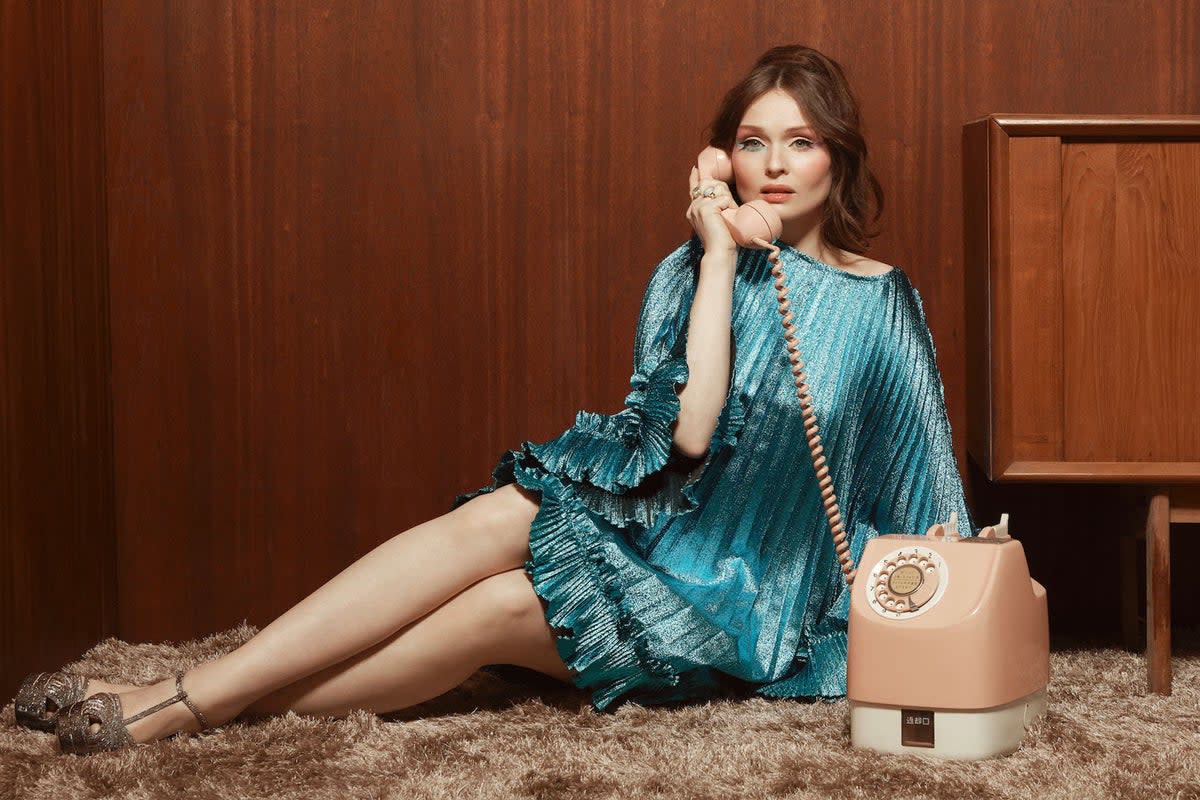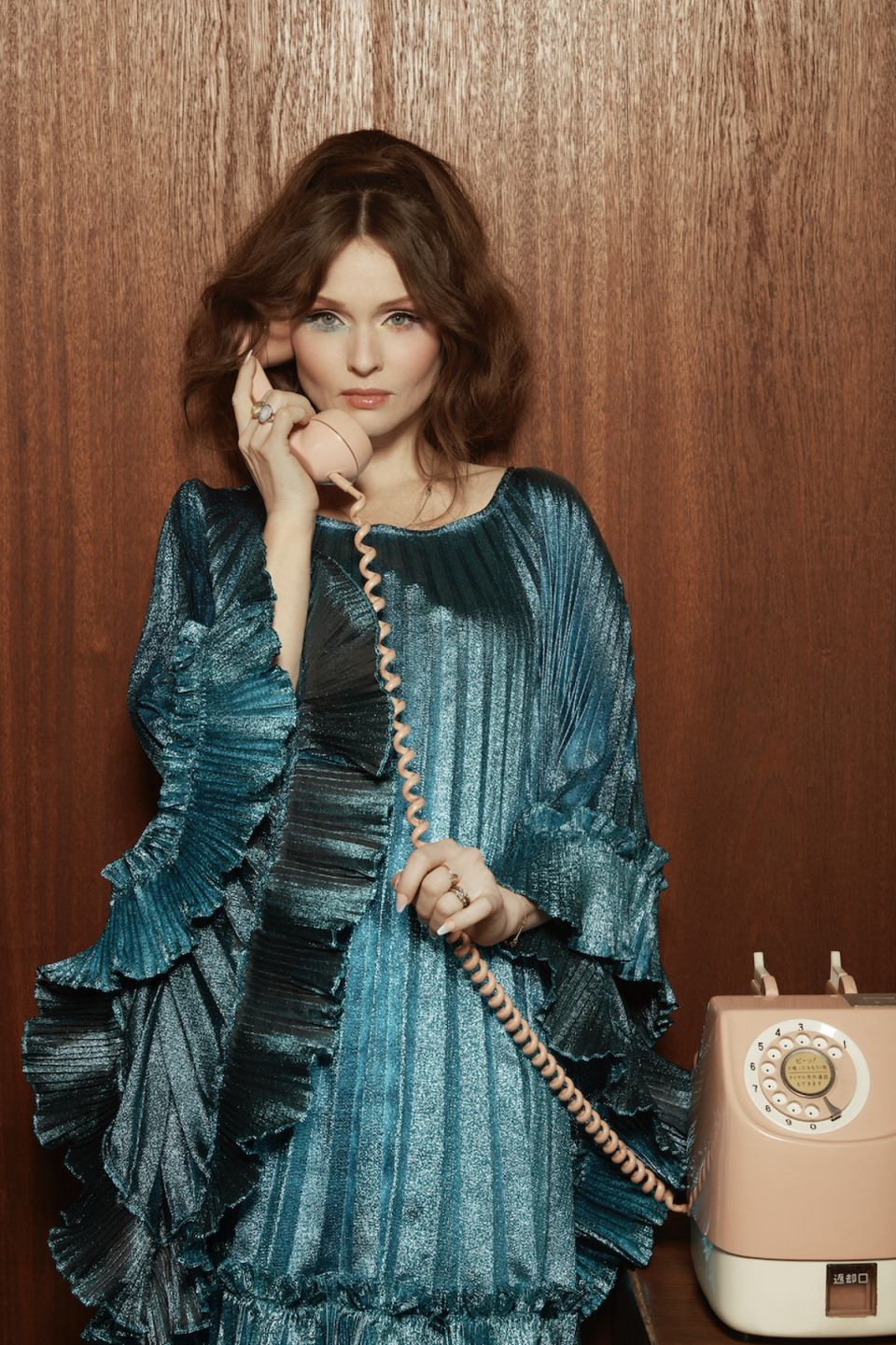Sophie Ellis-Bextor: ‘If I can’t be bold, what is the point?’

Stepping into Sophie Ellis-Bextor’s house for the very first time – a bright, colourful pad packed with weird and wonderful charity shop finds and walls plastered with felt-tip masterpieces by her five children – sparks a slightly hard-to-place sense of deja-vu.
As the singer potters around the kitchen, I spot the makeshift stage created for her now-legendary Kitchen Discos over the past few years. Originating in the earliest days of lockdown, the often chaotic shows featured the singer clambering over her breakdancing offspring and removing nearby hazards as she belted out her own greatest hits and feel-good pop covers in an array of glittery costumes. Her husband – The Feeling bassist Richard Jones – could occasionally be spotted dancing around in a horse mask.
“You’ve been here before!” Ellis-Bextor beams as we decamp to the living room. “It really did feel like everybody was here.”
Now flanked by a cabinet full of deadpan model dolls and a giant sculpture of the cartoon rabbit Miffy, she explains that prior to everything becoming incredibly weird, the family already hosted regular (but less “structured”) dance parties in the kitchen just for fun. The room was kitted out with a smoke machine, DJ decks, and its now-famous disco ball long before Ellis-Bextor decided to grab a microphone and invite everyone else along.
“I actually thought people were gonna make fun of us – or me, more specifically,” she laughs. But with schools shut, the kids stuck at home, and her diary suddenly empty, Ellis-Bextor felt she needed to do something to let off steam. “Putting on a sequined catsuit isn’t really a normal response to a national situation like that, but something in it made sense to me.”

It was a much-needed glimmer of silliness that emerged during that miserable first year of the pandemic, and after 20 virtual editions it has since evolved into a full-blown live tour and spin-off cookbook. Earlier this month Ellis-Bextor – who has also been touted by some as a contender to represent the UK at next year’s Eurovision – took the disco to Liverpool to entertain this year’s international revellers. Not only that, but she also has a new record on the way: HANA is her first full-length studio album in six years.
Though she’s now a patron saint of Noughties bops, best-known for dance-pop hits like Murder on the Dancefloor and Get Over You, Ellis-Bextor’s first step into the music industry was actually as vocalist in Britpop outfit Theaudience.
“At heart, I’ve always been an indie kid,” she says, taking a swig of tea from a Dolly Parton mug. Growing up in London (her mother is Janet Ellis, who some readers will remember as one of the presenters of kids’ TV show Blue Peter in the Eighties), Ellis-Bextor remembers feeling like she was at the epicentre of something special amid the Britpop explosion. Her bedroom walls were plastered with posters of Blur, Oasis, Pulp, Elastica, PJ Harvey, and Björk. Equally, she was a devoted reader of Smash Hits growing up, and loved Eighties pop.
“When I started, pop was quite a dirty word, really – in the early 2000s, it was just seen as very throwaway, very manufactured,” she says. “I was always quite keen to give pop a good name.”
Emerging in the late Nineties, Theaudience were nominated for Best New Band at the NME Awards, but were unceremoniously dropped by their label following their one and only album. Ellis-Bextor feared she’d lost her chance of becoming a professional singer, but then the Italian DJ Spiller came knocking.
The resulting collaboration, the house-inflected Groovejet (If This Ain’t Love), became “the song that changed everything”. The single ultimately went to number one, after being pitted against a newly-solo Victoria Beckham in a cartoon villain-style chart battle. “I was on the six o’clock news, I was on the front cover of papers… It was mind-blowing.”
Riding high on the success of Groovejet, Ellis-Bextor released a trio of major label records. For 2011’s Make a Scene she amicably parted ways with Universal and began releasing music on her own label EBGB instead; a nod to the New York City punk rock bar CBGB. “I was 34 at the time, and I thought: I just need to do something a bit more bold.”
For Ellis-Bextor, this manifested in 2014’s strange and wiry Wonderlust; a concept-heavy album that took influence from the Slavic folklore figure Baba Yaga. Familia, in 2016, also felt like a departure, inspired by Ellis-Bextor’s travels in Mexico. HANA – once again produced by frequent collaborator Ed Harcourt – draws on a trip to Japan in early 2020.
Those expecting another dose of Kitchen Disco might well be taken aback by HANA’s psychy, swirling take on prog-pop and the generous explorations of grief on tracks like Until the Wheels Fall Off. The song borrows the words of her step-dad John, who passed away in July 2020.
Two years previously, John had been diagnosed with terminal lung cancer. Following his death, the family were given a letter John had left behind, recounting his happy memories of drinking expensive wine on ordinary days and wringing out every last drop of life. “You know, when someone’s given you a posh candle, and you’re like: ‘Oh, I don’t want to burn it, because then I’ll have used up a really nice candle?’” she says. “Just burn the candle!”
Elsewhere on the album, Ellis-Bextor recounts a disorientating but beautiful trip to Tokyo in a song of the same name. It was a holiday choreographed by John: when it was clear he was too unwell to take the trip, his step-daughter took his place. “Oh I wasn’t supposed to come, but it happened that the fates, they had their fun,” she sings, following his imagined footsteps down brand new streets. Beneath the dark, looming clouds of Everything is Sweet, sawtooth synthesisers grind and squelch; Kitchen Disco this certainly is not. If anything, it calls more strongly to Ellis-Bextor’s indie roots.
“I could have done a poppy dance record right now,” she shrugs. “But that wasn’t really where my heart was at.”

Following HANA’s release, Ellis-Bextor is hitting the road. As well as her own headline tour and a number of upbeat, pop-heavy sets at Pride Cymru and Brockwell Park’s Noughties-fest Mighty Hoopla, she’s also playing the likes of Latitude, Isle of Wight, and Y Not festival. Though she’s hugely looking forward to a packed festival season, she admits to being disappointed by yet another year of male-dominated line-ups. Does she think that – as Glastonbury’s Emily Eavis has argued – there’s a “pipeline problem” at festivals to blame?
“What does that mean,” she says incredulously. “Women are stuck in pipes?!”
“I honestly think that it’s just not something that’s thought about that much at the planning stage,” she continues. “I shouldn’t bite the hand that feeds me because I’ve got a really lovely summer, but I’ve noticed sometimes that I’m the only woman, or there’s just not that many; I’ve definitely been aware of it, and it is across the board, it’s not just the big [festivals].”
“I definitely think there can be more conversations about having more women on bills, for sure.”
And with that, the doorbell rings; Ellis-Bextor sticks the kettle on again, and her next visitor gasps as they catch sight of the famous disco ball. “I hope I don’t get in trouble…” she says of her remarks on festival line-ups, but in all honesty she doesn’t look particularly worried.
“I really enjoyed the indulgence of making this record,” she tells me as I leave. After over 20 years of shapeshifting, Ellis-Bextor seems to be in a place where she can pursue whatever fulfils her creatively, from full-blown party-mode to the gnarled intimacy of HANA. “If I can’t be bold,” she says, “what is the point?”
Sophie Ellis-Bextor’s new album HANA is out June 2

 Yahoo News
Yahoo News 
